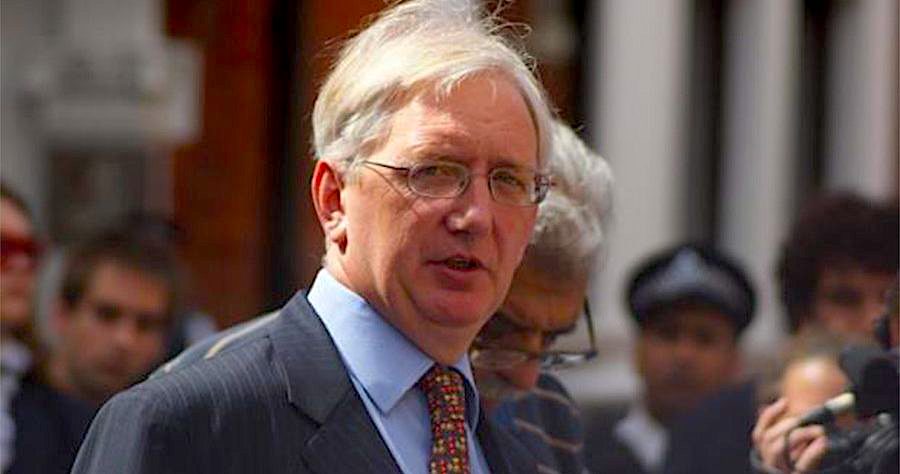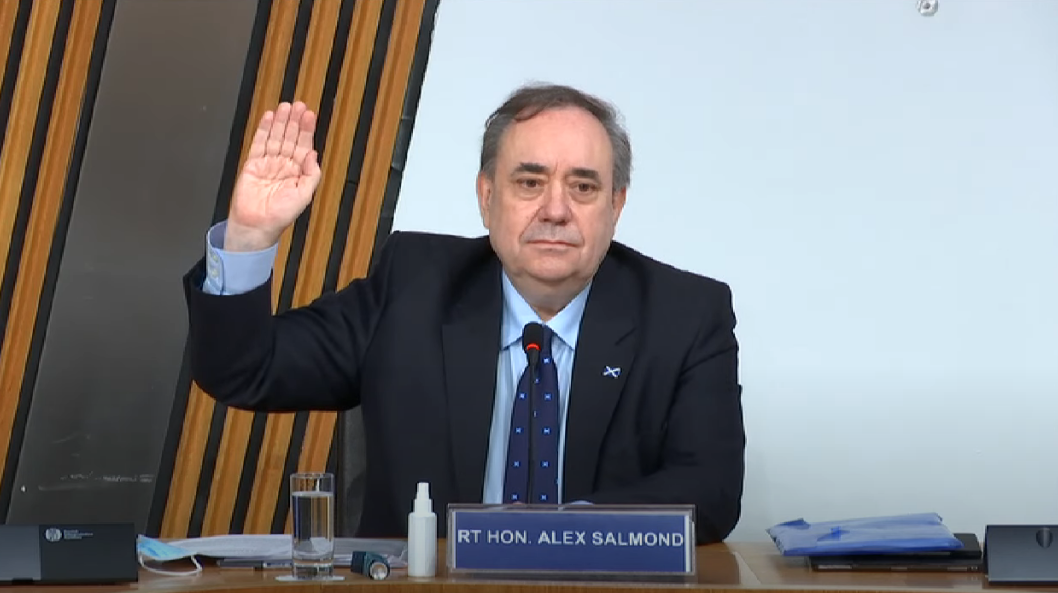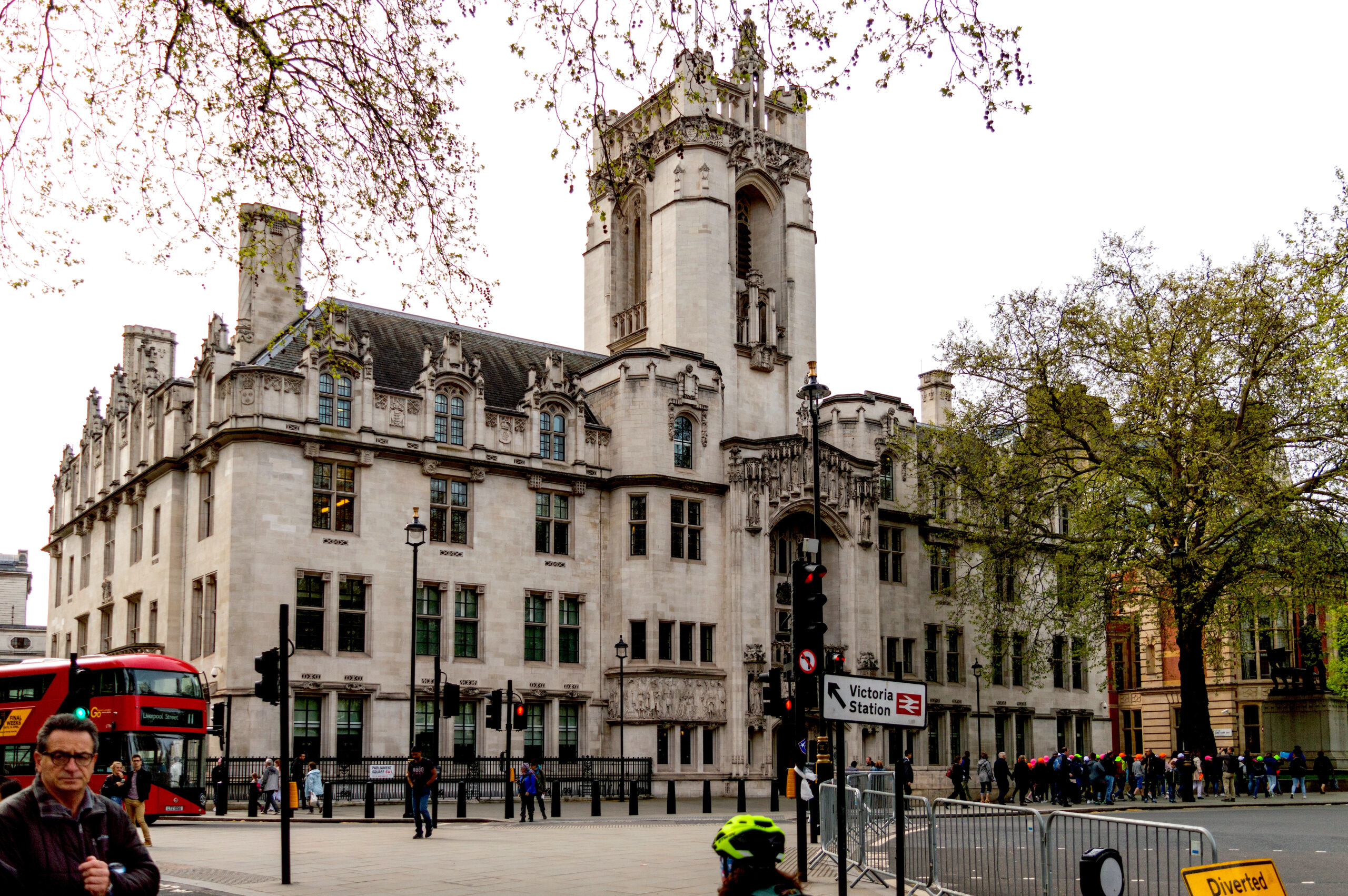The defence counsel has reasonably criticized the decision to impose a prison sentence, writes Alexander Mercouris.

Scotland’s High Court in Edinburgh. (Andycatlincom, CC BY-SA 4.0, Wikimedia Commons)
By Alexander Mercouris
in London
Special to Consortium News
 The troubling conviction of former British diplomat Craig Murray for contempt of court in connection with his coverage of the prosecution of the prominent Scottish nationalist politician Alex Salmond on sexual assault charges has now produced an equally troubling sentence by a tribunal of the Scottish High Court of eight months in prison for Murray.
The troubling conviction of former British diplomat Craig Murray for contempt of court in connection with his coverage of the prosecution of the prominent Scottish nationalist politician Alex Salmond on sexual assault charges has now produced an equally troubling sentence by a tribunal of the Scottish High Court of eight months in prison for Murray.
In my two previous letters on the Murray case, I discussed the political background and legal issues, in particular the way in which the so-called objective test, which the Court was purporting to apply when assessing Murray’s reporting, threatened to make media reporting of a case such as Salmond’s all but impossible in any meaningful sense.
The Court said that according to the “objective test,” it did not actually matter whether reporting of a case did in fact result in the public identification of a witness or complainant who had made sexual assault allegations against a defendant. Nor did it matter if the reporter who wrote about the Salmond trial had any intention that his or her report would lead to the public identification of a witness or complainant. It sufficed for the reporter to be in contempt of court, according to the Court, if a witness or complainant might conceivably be identified, including by persons who know them intimately.
Please Support Our Spring Fund Drive!
Given such a test I do not see how balanced reporting of a case like the one brought against Salmond (which ended in acquittal) would be possible in practical terms. It does not seem possible to provide an article that reported the case fully and properly but which also did not report at least some facts which some people might say, rightly or wrongly, could conceivably cause the identification by someone of a witness or complainant.

Craig Murray.
Given that the defendant does not enjoy similar protections, that seems to me to contradict the overriding legal and human rights obligation for equal and balanced justice, which requires that trials, save in exceptional circumstances, be conducted openly, and be reported in a full and balanced way.
In saying this it is essential to stress that the protection of witnesses and complainants in sexual assault cases is a paramount priority, and that the need to take steps to provide them with protection by securing their anonymity is not at issue. However, to use this obligation to prevent balanced reporting of a case, especially one like Salmond’s, which had important public and political implications, seems to me to go too far and looks oppressive. It appears to extinguish the right to a fair and open trial, which can only be secured by fair and balanced reporting. Inevitably that begs the question of whether the true intention of the Court’s order of anonymity was less to protect witnesses and complainants and more to prevent the balanced reporting of the case.
Here it is important to say that proportionality is a fundamental principle of human rights law. It seems to me that the Court’s “objective test” risks offending against the principle of proportionality, to the point where the right to fair and equal justice is extinguished.

Alex Salmond preparing to give evidence to the Committee on the Scottish Government Handling of Harassment Complaints, Feb. 26. (Scottish Parliament, Wikimedia Commons)
In sentencing Murray, it is possible that the Court was alive to these concerns because in its sentencing comments it appeared to have moved away from a strict application of the “objective test.” Instead, it spoke as if Murray by his reporting had actually intended that the identities of the complainers in Salmond’s case should be revealed. Murray’s breach of orders conferring anonymity on the complainants was according to the Court’s sentencing comments not inadvertent. On the contrary, the Court said it was brazenly willful. Indeed, Judge Lady Dorrian spoke of Murray actually “relishing” the possibility that the identities of the complainants might be revealed as a result of his reporting.
This has introduced an element of malice into Murray’s reporting which to my knowledge had not been mentioned before.
Up to a Higher Court
It will be for the Supreme Court to decide whether the evidence that was presented to the Court does indeed prove such an element of malice on Murray’s part. In my opinion the evidence does not show it. Of course, Murray, in his affidavit evidence, denies that he had any intention or desire to reveal the identities of the complainants. Instead, he goes to great length to explain the painstaking steps he took to avoid the “jigsaw” identification of the complainants. If true, that would mean that the malice the Court claims as the reason for his actions never existed.
At the very least I would have expected the Court to have held back from making sweeping conclusions about his intentions and desires without first hearing from him under examination and on oath on the witness stand during his trial. Nothing like that of course happened. Perhaps it is not the practice to do that in cases of this kind in Scotland. However, it is another feature of the case that is troubling.

Middlesex Guildhall in London, home of the Supreme Court of the U.K., in 2018. (Tristan Surtel, CC BY-SA 4.0, Wikimedia Commons)
Having said that Murray’s actions were malicious, the Court proceeded to sentence him to prison.
This despite the fact that Murray is a person of good character, who is in his sixties and in poor health, and who has a family which includes two young children, one of whom is a baby only a few months old.
Murray’s defence counsel has reasonably criticised the Court’s decision to impose a prison sentence as being “harsh to the point of being disproportionate.”
The imposition of a prison sentence in a case of this sort is inevitably going to foster claims by some people that call into question the authorities’ good faith in bringing the case. Some will no doubt point to the prison sentence as “proof” that the real purpose of the case was not to protect the complainants or to uphold the law, but rather to punish Murray, who has been a thorn in the side of the establishment, both in London and in Edinburgh, for many years now.
I have seen no evidence that this is so, and the Scottish authorities will of course strenuously deny it. There are no doubt people who make these sort of claims regardless of the outcome of the case. However, the fact remains that the imposition of this prison sentence will make these claims more prevalent, and perhaps more widely believed. That would be an unfortunate blow for Scottish justice.
Murray intends to appeal the decision to the U.K. Supreme Court in London. I hope that the Supreme Court, in looking at Murray’s appeal, will provide some much-needed clarity about the true meaning and purpose of the “objective test.”
I also hope that the Supreme Court will consider whether the finding of malice made against Murray by the Court in Edinburgh is warranted, and whether the evidence presented to the Court really justifies such a conclusion, which was arrived at without the Court hearing from Murray himself.
Lastly, I hope that the Supreme Court will also look at whether imposing a prison sentence on a man in his sixties of good character with well-known health problems, a family, and two young children, is appropriate in a case such as this. The Supreme Court should look at all these issues, including both at the Court’s verdict and its sentence, its summary of the facts and its analysis of the law.
Even if the Supreme Court were to decide that the verdict was wrong, and that Murray is innocent, I believe it would still be entitled to say that the decision to impose a prison sentence on him was wrong, and would have been wrong even if Murray had been guilty.
It seems that clarification of all of these issues is urgently needed, if balanced reporting of court cases is to be possible, this being a vitally important issue, which goes beyond the serious questions raised about Murray’s treatment in his own case.
Murray appears deserving of the same sort of support that Murray has himself provided to his friend Julian Assange, the imprisoned WikiLeaks publisher.
Alexander Mercouris is a legal analyst, political commentator and editor of The Duran.



You can contribute to Murray’s legal expenses fund easily at his website, also in dollars.
Being resident in Scotland , I have been following Craigs case closely, and indeed the Salmond trial itself at the time.
My observation is that Salmonds trial was simply a political expedient to silence Salmond for good.
The Scottish Gov/SNP and the UK gov did not want the man regenerating the independence movement. Status quo at all costs. The trial proceedings proved beyond all doubt his innocence of the cooked up accusations and lies.
Craig wrote honestly, and my impression was that he was at great pains not to be in contempt, with “jigsaw” or otherwise.
He was held in contempt purely to stop him reporting the truth of the trial.
So that an air of “Salmond is guilty even if he was aquitted” could prevail with no accuracte reporting of the defence, thus damaging any return to the political arena, as potentially a threat to Nicola.
Good, concise, and persuasive analysis. Thanks. Craig is a political prisoner. Scotland, as it showed in Kenmure St yesterday, is better than this
This case has many troubling aspects but they ultimately all lead back to the fear by Nicola Sturgeon that Alex Salmond was going to make a political comeback. Her imposter syndrome makes her acutely vulnerable to this fear and left her open to exploitation by the Westminster establishment via the agency of Leslie Evans. When Evans botched the internal complaints process costing the Scottish government £1m there was a panic that an investigation might find out shat had been happening. So it was imperative to initiate a criminal investigation (against the wishes of the so called complainers).
Someone from within the Scottish government or the SNP hierarchy leaked the accusations to the Daily Record hours before an interdict came into place, paving the way for an organised smear campaign (no serious effort has been made to find out who did it although there are only a couple of candidates).
Had Craig Murray not reported the defence case nobody would have understood how Salmond ‘got off’. Thanks to Craig we know that the prosecution case was a tissue of lies. In fact the main accuser was proved in court to have lied under oath and was warned several times by the judge. Strangely (not strangely) she hasn’t been prosecuted for perjury and has been granted anonymity. Craig has been targeted because he busted their plot wide open.
I should mention that many people believed that I was asserting that all of this “jigsaw” nonsense applied to the jury in the Murray, where of course there was in fact no jury at all, but merely three infallible inquisitors of the Crown’s latest Star Chamber. The fault here is mine, since I did at one point mention the “Murray” case in the context of possible jury manipulation when of course I meant to refer only to the “Salmond” case, as I hope the context might have made clear — probably not.
I also have many thoughts about the Mercouris article today. And while it is hard to think of anyone in this sorry old world whose legal opinions I respect more than Alexander’s, I, too, like many who have already commented on the piece, viewed it as being primarily a kind of “Apologia” to the Crown, even raising the status of Murray’s age and poor health [Christ, I myself am both older and sicker!] as a kind of plea for mercy, — ala’ the chilling, still traumatizing, Assange extradition verdict of Ms. Baraitser — and less analytical and critical than the man is surely quite capable of providing.
I also disagree with Mercouris on certain points of law, especially with his intended criticism cancelling assumption that:
“it is essential to stress that the protection of witnesses and complainants in sexual assault cases is a paramount priority,” … so far so good! …. “and that the need to PROVIDE THEM WITH PROTECTION BY SECURING THEIR ANONYMITY is not at issue.”
Not at all good, because that is, at least to me and many of the other commentators here, indeed one of the PRIMARY issues raised by this latest British travesty of jurisprudence. In fact, as long as this rather Victorian leftover doctrine that women must be protected from men by being made anonymous, i.e. by being erased of their identity, egregious abuses, such as have happened to Mr. Murray, will remain all too easy for vengeful political and legal actors to carry out.
I also view quite differently than Mercouris the potentially baleful, if decidedly likely, political consequences the thoroughly mistaken Murray verdict is likely to provoke.
I will stop here for now, read some more of the always thought-provoking comments as they continue to come in, and then, perhaps, spell out my differences with Mercouris’ perspective in a subsequent comment. Thanks again to all of you who responded to me!!
“Lady” Dorrian is an evil, lying hack. She’s certainly no lady, and I have my doubts she’s human.
But she is the top judge in Scotland. Remind me to never go live there.
I want out if here if this is Scotland c2021. Looks as though I’m stuck here, however. I would venture that Sturgeon is an even more evil hack than Dorrian. It’s almost unbelievable how she’s wrecked and corrupted this country. The British state will destroy her when it sees fit – she’s an idiot as well as evil.
Like many judges, Lady Dorrian was first a QC. It seems arguable that a career as a barrister is not the ideal background for a judge. Successful barristers are sometimes little more than persuasive sophists, with a poor knowledge of the law and an even weaker grasp of its underlying principles. Winning cases is their only criterion of success.
Has Julian Assange heard the news about Craig Murray? This is so devastating. Murray has been targeted because of his support for Julian. More kangaroo court “justice”, this time in Scotland. This is quite apart from Murray’s revealing of the inner-party intrigues of the SNP, which deserve to see the light.
I think that one of the reasons for Craig’s prison sentence is to prevent him giving evidence in the Assange-related trial in Spain.
The judge’s animus towards him is shocking. The jury in the Salmond trial found Salmond not guilty – which meant that his accusers had perjured themselves. Yet none of them have been called to account for lying to the court. They retain their anonymity.
You are quite right. The long reach of the United States vengeance machine is evident here.
Good job, Mr. Mercouris!
I read some of Craig Murray’s writings on Salmond when he first published them at his blog. As an American citizen at first I was ignorant as to what the whole case was about.
I expect I didn’t read all them, but in the pieces that I did read, my clear impression was that Murray’s primary concern was not maliciously to reveal anyone’s identity—what good would that do?—but to defend Salmond against malicious accusations against him by pointing out he weaknesses of the case against Salmond.
When it comes to “malice,” the shoe is really on the wrong foot. What can be m ore malicious than falsely accusing an innocent man, and doing so for malicious purposes connected with political fractional intriguing? Even a “revenge” scenario is more comprehensible than the coldhearted, malicious plotting that appears to have been going on in Scotland’s Green Room.
Maliciousness? Let’s just shoot the messenger of the malice located in the Scottish political, Craig Murray, rather than acknowledge the cravenness of those who attempted to use malice to bring Salmond, and now Murray, down.
Of course Murray may also be getting punished for courageously standing up for Julian Assange. There is something very disturbing about the theme that runs through both of these cases of the cynical and malicious weaponization of sexual abuse accusations.
If politicians can do such things, they will. “Democratic” politics filters out the virtuous, decent and scrupulous and spits out at the top of the tube only the most conscienceless psychopaths. They have no sense of guilt or honour.
The only way to stop filthy conspiracies like this is to change the law. For a start the privilege of anonymity for accusers should be abolished. At the very least, it should be withdrawn completely should the accused by found innocent.
“For a start the privilege of anonymity for accusers should be abolished. At the very least, it should be withdrawn completely should the accused by found innocent.”
Quite right. I thought it was enshrined in common law or something that one has the right to face one’s accusers.
This “anonymous denunciation” scenario smacks of Nazi Germany and the DDR. HOw an one even establish that an accuser has been lying if she isn’t subjected to testifying and being cross-examined under oath? It seems like the MeToo concept—just believe any female who accuses a male of anything the female interprets as sexual abuse—has really gone off the rails bigtime and has created fertile ground for this Kafkaesque scenario.
Anonymous accusers get the kid glove treatment, and let the justice, or injustice, chips fall where they may.
In the Salmond case the MeToo concept is itself on trial. Verdict: Guilty of creating gross miscarriage of justice.
I can appreciate A M’s caution in preferring not to deliberate on the overt political nature of the prosecution and sentencing of the troublesome activist, citizen journalist and ex diplomat Craig Murray but there is too much at stake here particularly the defendant’s poor health to ignore the parallels with the frame up and persecution of Julian Assange. In evidence I believe we can discern that same instrumentalization of the administration of justice with the illusion of legality to punish an outstanding critic of the UK corrupt warfare state.
This case seems an excellent example of the need for restorative justice to become the heart of the UK’s responses to offending behaviour. Whether Mr Murray intended harm or not, whether his actions might conceivably have identified anonymous witnesses, what good does it do our society to cause him and his family great harm? There is an assumption amongst the chattering classes when ‘talking seriously’ that all crimes must require punishment. Do they? Why? Was this always the case in human societies? Are there better ways to deal with harmful behaviour?
I would quibble. The main point is not “need to restorative justice” but injustice and violence on the side of the court. Logic was tortured, noble (if not always innocent) English language was violated. The construct of “objective test” is subjective in the extreme as it requires to create mental scenarios in which tidbits in writing may, or may not, “identify”. As those scenarios are barely sketched (only that the person making the identification could be a coworker or otherwise familiar with an accused), it boils down to an impression. Thus the result of the test depends on the strength of imagination of the judges, and not on the reality outside their brains. This is the very definition of “subjective”, and opposite to “objective”, something that is true or not regardless of the mental state of the person.
Once you violate the language, it is hard to be logical. After calling some verbiage a “test”, you divide people into guilty and not guilty, with no shade in between. For example, a court in Poland found a 70-ish female protester innocent of “violently resisting arrest” not because she refrained from any gestures with her hands and legs (she was prone on the ground) but because the most offending gestures, with the legs, were a natural instinctive reaction that did not make any harm. Similarly, she used harsh language that may be translated as “you moron”, but the court rejected the related accusation. Making a distinction between harmful and harmless violation is essential. In this example, a policeman could be “hit” be a slowly moving fit, but he changed his position. But if he instead leaned down in a certain way, a toe of the old lady could hit him in the eye. However, it is important for the court to stay as close to the facts that happen, and gauge the probability of harm — say that the old lady were swinging a sharp dagger rather than wiggling a bare foot, the potential harm could be legitimately considered.
Thus when a judge stretches a concept, especially in a novel way, he/she has to recognize that the more a concept has to be stretched, the more minor the caliber of the offense.
Quite right, Piotr.
It strikes me that what Dorrian & Co have done here is the good old “Big Lie” technique.
Call something an “objective test” and the little people will assume that no judge could utter such an enormous lie.
The “objective” test is completely and utterly subjective. It exists only in the minds of Dorrian & Co, who seek retribution for their exposure by Craig Murray.
And as for the “malice” attributed by Dorrian & Co, Craig himself points out that he could easily have published the full names prior to the order for anonimity. If he so “relished” the prospect of complainant identification, as Dorrian asserts, why did he not do so?
There are so many holes in this abortion that one can only conclude they are playing for time. They are trying to prevent Craig from giving evidence in Spain in six days.
“They are trying to prevent Craig from giving evidence in Spain in six days.”
I suspect that is exactly it. I hope the Spanish authorities subpoena Murray and set up a Zoom alternative so that he HAS to testify.
There are many people who see that the original prosecution of Salmond for sexual assault and the current charges against Murray are judicial efforts to thwart the independence movement. In short these cases are part of a larger political witch hunt and it seems clear to me that both of these men are completely innocent as matter of fact. Mercouris is writing as if he is addressing a one her majesties courts and is carefully attempting to avoid ruffling the feelings of some justice or other. In fact, these cases are political and they should be described in uncertain terms we are watching a political witch hunt.
Exactly. “No evidence that this is so”? Baloney. Simply the lie stated by “Lady” Dorrian (that Murray intentionally, and with malice, intended to identify the accusers) shows that this is not a good faith effort by Scottish “justice”.
This is simply a powerful government crushing a dissident, with as much force as they think they can get away with, without arousing the sleeping public (which is one thing they fear).
Of course it is payback. For Assange. For journalism. They saw their chance for vengeance and cruelty. For being upright and honorable in the face of the very much neither upright nor honorable UK government, and in their own faces because they haven’t an honor among all their “honors.”
It is also a message that we are in a fully repressed society in the UK and the US and … , and that we all should watch ourselves now.
That said, while I originally went along with the idea of protecting certain identities, fully (certainly seemed so obviously a good idea), I think that needs to be spelled out now on a case by case basis. To some extent, for some, being afraid to come forward just grinds in the fear ever more, not to mention, we have to see this in other types of cases as well.
However, secrecy rules, almost always, sooner or later, get used by those in power in even worse ways to hide injustice and to menace us. They really just back up on us, like HIPA, supposedly to protect patient information (good goal) instead get used to railroad those same patients by making sure the owners of the system attack patients (usually in some monetary way).
“Publicity is justly commended as a remedy for social and industrial diseases. Sunlight is said to be the best of disinfectants; electric light the most efficient policeman”.
– US Supreme Court Justice Louis Brandeis (1856-1941)
For good measure, I might add the weighty opinion of a man who was no lawyer, but one of the wisest and fairest England has ever produced.
“Where secrecy or mystery begins, vice or roguery is not far off”.
– Samuel Johnson
To add secrecy and mystery to what should be the open and transparent administration of justice is to invite all manner of corruption.
The last sentence: “Murray appears deserving of the same sort of support that Murray has himself provided to his friend Julian Assange, the imprisoned WikiLeaks publisher” probably should have been first, as explains the situation best.